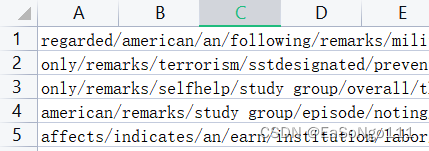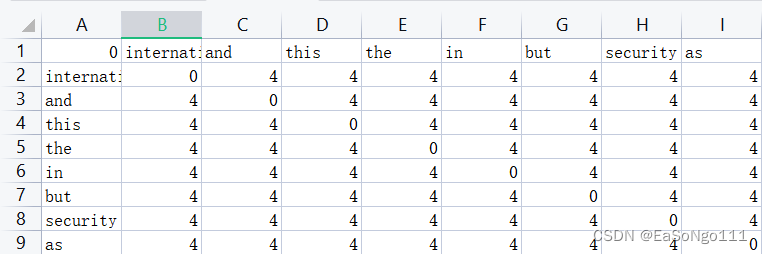import os
import re
import pandas as pd
from PyPDF2 import PdfFileReader
import string
import yake
if __name__ == '__main__':
# 运行第一部分代码
pdf_files_path = 'C:/Users/win10/Documents/美国智库/pdf_files'
# 定义一个函数,用于读取PDF文件并将其转化成文本
def read_pdf(filename):
filepath = os.path.join(pdf_files_path, filename)
with open(filepath, 'rb') as f:
pdf = PdfFileReader(f)
text = ''
for i in range(pdf.getNumPages()):
page = pdf.getPage(i)
text += page.extractText()
return text
# 读取Excel文件
df = pd.read_excel(r'C:\Users\win10\Desktop\2022.xlsx')
# 循环遍历每行数据
for index, row in df.iterrows():
# 判断是否有PDF文件名
if pd.notna(row['pdf_filename']):
try:
# 尝试读取PDF文件并识别成文字
text = read_pdf(row['pdf_filename'])
except:
# 读取失败则跳过
continue
# 替换art_content列的值为PDF中的文字
df.at[index, 'art_content'] = text
# 对art_content列进行分词
stop_words = ["stop_words = ["'d", "'ll", "'m", "'re", "'s", "'t", "'ve", 'ZT', 'ZZ', 'a', "a's", 'able', 'about', 'above', 'abst', 'accordance', 'according', 'accordingly', 'across', 'act', 'actually', 'added', 'adj', 'adopted', 'affected', 'affecting', 'affects', 'after', 'afterwards', 'again', 'against', 'ah', "ain't", 'all', 'allow', 'allows', 'almost', 'alone', 'along', 'already', 'also', 'although', 'always', 'am', 'among', 'amongst', 'an', 'and', 'announce', 'another', 'any', 'anybody', 'anyhow', 'anymore', 'anyone', 'anything', 'anyway', 'anyways', 'anywhere', 'apart', 'apparently', 'appear', 'appreciate', 'appropriate', 'approximately', 'are', 'area', 'areas', 'aren', "aren't", 'arent', 'arise', 'around', 'as', 'aside', 'ask', 'asked', 'asking', 'asks', 'associated', 'at', 'auth', 'available', 'away', 'awfully', 'b', 'back', 'backed', 'backing', 'backs', 'be', 'became', 'because', 'become', 'becomes', 'becoming', 'been', 'before', 'beforehand', 'began', 'begin', 'beginning', 'beginnings', 'begins', 'behind', 'being', 'beings', 'believe', 'below', 'beside', 'besides', 'best', 'better', 'between', 'beyond', 'big', 'biol', 'both', 'brief', 'briefly', 'but', 'by', 'c', "c'mon", "c's", 'ca', 'came', 'can', "can't", 'cannot', 'cant', 'case', 'cases', 'cause', 'causes', 'certain', 'certainly', 'changes', 'clear', 'clearly', 'co', 'com', 'come', 'comes', 'concerning', 'consequently', 'consider', 'considering', 'contain', 'containing', 'contains', 'corresponding', 'could', "couldn't", 'couldnt', 'course', 'currently', 'd', 'date', 'definitely', 'describe', 'described', 'despite', 'did', "didn't", 'differ', 'different', 'differently', 'discuss', 'do', 'does', "doesn't", 'doing', "don't", 'done', 'down', 'downed', 'downing', 'downs', 'downwards', 'due', 'during', 'e', 'each', 'early', 'ed', 'edu', 'effect', 'eg', 'eight', 'eighty', 'either', 'else', 'elsewhere', 'end', 'ended', 'ending', 'ends', 'enough', 'entirely', 'especially', 'et', 'et-al', 'etc', 'even', 'evenly', 'ever', 'every', 'everybody', 'everyone', 'everything', 'everywhere', 'ex', 'exactly', 'example', 'except', 'f', 'face', 'faces', 'fact', 'facts', 'far', 'felt', 'few', 'ff', 'fifth', 'find', 'finds', 'first', 'five', 'fix', 'followed', 'following', 'follows', 'for', 'former', 'formerly', 'forth', 'found', 'four', 'from', 'full', 'fully', 'further', 'furthered', 'furthering', 'furthermore', 'furthers', 'g', 'gave', 'general', 'generally', 'get', 'gets', 'getting', 'give', 'given', 'gives', 'giving', 'go', 'goes', 'going', 'gone', 'good', 'goods', 'got', 'gotten', 'great', 'greater', 'greatest', 'greetings', 'group', 'grouped', 'grouping', 'groups', 'h', 'had', "hadn't", 'happens', 'hardly', 'has', "hasn't", 'have', "haven't", 'having', 'he', "he's", 'hed', 'hello', 'help', 'hence', 'her', 'here', "here's", 'hereafter', 'hereby', 'herein', 'heres', 'hereupon', 'hers', 'herself', 'hes', 'hi', 'hid', 'high', 'higher', 'highest', 'him', 'himself', 'his', 'hither', 'home', 'hopefully', 'how', 'howbeit', 'however', 'hundred', 'i', "i'd", "i'll", "i'm", "i've", 'id', 'ie', 'if', 'ignored', 'im', 'immediate', 'immediately', 'importance', 'important', 'in', 'inasmuch', 'inc', 'include', 'indeed', 'index', 'indicate', 'indicated', 'indicates', 'information', 'inner', 'insofar', 'instead', 'interest', 'interested', 'interesting', 'interests', 'into', 'invention', 'inward', 'is', "isn't", 'it', "it'd", "it'll", "it's", 'itd', 'its', 'itself', 'j', 'just', 'k', 'keep', 'keeps', 'kept', 'keys', 'kg', 'kind', 'km', 'knew', 'know', 'known', 'knows', 'l', 'large', 'largely', 'last', 'lately', 'later', 'latest', 'latter', 'latterly', 'least', 'less', 'lest', 'let', "let's", 'lets', 'like', 'liked', 'likely', 'line', 'little', 'long', 'longer', 'longest', 'look', 'looking', 'looks', 'ltd', 'm', 'made', 'mainly', 'make', 'makes', 'making', 'man', 'many', 'may', 'maybe', 'me', 'mean', 'means', 'meantime', 'meanwhile', 'member', 'members', 'men', 'merely', 'mg', 'might', 'million', 'miss', 'ml', 'more', 'moreover', 'most', 'mostly', 'mr', 'mrs', 'much', 'mug', 'must', 'my', 'myself', 'n', "n't", 'na', 'name', 'namely', 'nay', 'nd', 'near', 'nearly', 'necessarily', 'necessary', 'need', 'needed', 'needing', 'needs', 'neither', 'never', 'nevertheless', 'new', 'newer', 'newest', 'next', 'nine', 'ninety', 'no', 'nobody', 'non', 'none', 'nonetheless', 'noone', 'nor', 'normally', 'nos', 'not', 'noted', 'nothing', 'novel', 'now', 'nowhere', 'number', 'numbers', 'o', 'obtain', 'obtained', 'obviously', 'of', 'off', 'often', 'oh', 'ok', 'okay', 'old', 'older', 'oldest', 'omitted', 'on', 'once', 'one', 'ones', 'only', 'onto', 'open', 'opened', 'opening', 'opens', 'or', 'ord', 'order', 'ordered', 'ordering', 'orders', 'other', 'others', 'otherwise', 'ought', 'our', 'ours', 'ourselves', 'out', 'outside', 'over', 'overall', 'owing', 'own', 'p', 'page', 'pages', 'part', 'parted', 'particular', 'particularly', 'parting', 'parts', 'past', 'per', 'perhaps', 'place', 'placed', 'places', 'please', 'plus', 'point', 'pointed', 'pointing', 'points', 'poorly', 'possible', 'possibly', 'potentially', 'pp', 'predominantly', 'present', 'presented', 'presenting', 'presents', 'presumably', 'previously', 'primarily', 'probably', 'problem', 'problems', 'promptly', 'proud', 'provides', 'put', 'puts', 'q', 'que', 'quickly', 'quite', 'qv', 'r', 'ran', 'rather', 'rd', 're', 'readily', 'really', 'reasonably', 'recent', 'recently', 'ref', 'refs', 'regarding', 'regardless', 'regards', 'related', 'relatively', 'research', 'respectively', 'resulted', 'resulting', 'results', 'right', 'room', 'rooms', 'run', 's', 'said', 'same', 'saw', 'say', 'saying', 'says', 'sec', 'second', 'secondly', 'seconds', 'section', 'see', 'seeing', 'seem', 'seemed', 'seeming', 'seems', 'seen', 'sees', 'self', 'selves', 'sensible', 'sent', 'serious', 'seriously', 'seven', 'several', 'shall', 'she', "she'll", 'shed', 'shes', 'should', "shouldn't", 'show', 'showed', 'showing', 'shown', 'showns', 'shows', 'side', 'sides', 'significant', 'significantly', 'similar', 'similarly', 'since', 'six', 'slightly', 'small', 'smaller', 'smallest', 'so', 'some', 'somebody', 'somehow', 'someone', 'somethan', 'something', 'sometime', 'sometimes', 'somewhat', 'somewhere', 'soon', 'sorry', 'specifically', 'specified', 'specify', 'specifying', 'state', 'states', 'still', 'stop', 'strongly', 'sub', 'substantially', 'successfully', 'such', 'sufficiently', 'suggest', 'sup', 'sure', 't', "t's", 'take', 'taken', 'taking', 'tell', 'tends', 'th', 'than', 'thank', 'thanks', 'thanx', 'that', "that'll", "that's", "that've", 'thats', 'the', 'their', 'theirs', 'them', 'themselves', 'then', 'thence', 'there', "there'll", "there's", "there've", 'thereafter', 'thereby', 'thered', 'therefore', 'therein', 'thereof', 'therere', 'theres', 'thereto', 'thereupon', 'these', 'they', "they'd", "they'll", "they're", "they've", 'theyd', 'theyre', 'thing', 'things', 'think', 'thinks', 'third', 'this', 'thorough', 'thoroughly', 'those', 'thou', 'though', 'thoughh', 'thought', 'thoughts', 'thousand', 'three', 'throug', 'through', 'throughout', 'thru', 'thus', 'til', 'tip', 'to', 'today', 'together', 'too', 'took', 'toward', 'towards', 'tried', 'tries', 'truly', 'try', 'trying', 'ts', 'turn', 'turned', 'turning', 'turns', 'twice', 'two', 'u', 'un', 'under', 'unfortunately', 'unless', 'unlike', 'unlikely', 'until', 'unto', 'up', 'upon', 'ups', 'us', 'use', 'used', 'useful', 'usefully', 'usefulness', 'uses', 'using', 'usually', 'uucp', 'v', 'value', 'various', 'very', 'via', 'viz', 'vol', 'vols', 'vs', 'w', 'want', 'wanted', 'wanting', 'wants', 'was', "wasn't", 'way', 'ways', 'we', "we'd", "we'll", "we're", "we've", 'wed', 'welcome', 'well', 'wells', 'went', 'were', "weren't", 'what', "what'll", "what's", 'whatever', 'whats', 'when', 'whence', 'whenever', 'where', "where's", 'whereafter', 'whereas', 'whereby', 'wherein', 'wheres', 'whereupon', 'wherever', 'whether', 'which', 'while', 'whim', 'whither', 'who', "who'll", "who's", 'whod', 'whoever', 'whole', 'whom', 'whomever', 'whos', 'whose', 'why', 'widely', 'will', 'willing', 'wish', 'with', 'within', 'without', "won't", 'wonder', 'words', 'work', 'worked', 'working', 'works', 'world', 'would', "wouldn't", 'www', 'x', 'y', 'year', 'years', 'yes', 'yet', 'you', "you'd", "you'll", "you're", "you've", 'youd', 'young', 'younger', 'youngest', 'your', 'youre', 'yours', 'yourself', 'yourselves', 'z', 'zero', 'zt', 'zz', '!', '#', '(', ')', '*', '+', '-', '.', '/', ':', ';', '<', '=', '>', '?', '@', '[', ']', '^', '_', '`', '{', '|', '}', '~']"]
def phrase_extract(text):
text = text.lower()
custom_kw_extractor = yake.KeywordExtractor(top=10, lan="en")
keywords = custom_kw_extractor.extract_keywords(text)
phrase_list = []
for keyword, score in keywords:
if len(keyword.split(' ')) > 1:
phrase_list.append(keyword.lower())
phrases_list = []
for phrase in phrase_list:
for i in range(0, len(text.split(phrase)) - 1):
phrases_list.append(phrase)
return phrases_list
def segment(text):
phrases_list = phrase_extract(text)
word_list = []
for i in text.split(' '):
word_list.append(i)
table = str.maketrans('', '', string.punctuation)
tokens = [w.translate(table) for w in word_list]
tokens = [word for word in tokens if word.isalpha()]
tokens = [word.lower() for word in tokens if word.lower() not in stop_words] # 过滤停用词
tokens = [word for word in tokens if len(word) > 1]
tokens = list(set(tokens+phrases_list))
return tokens
df['col'] = df['art_content'].apply(lambda x: '/'.join(segment(x)).lower())
df['col'].to_excel(r'C:\Users\win10\Desktop\结果P1.xlsx', index=False, header=False)
# -*- coding: utf-8 -*-
import numpy as np
import time
from pprint import pprint as p
import pandas as pd
def log(func):
def wrapper(*args, **kwargs):
now_time = str(time.strftime('%Y-%m-%d %X', time.localtime()))
print('------------------------------------------------')
print('%s func [%s] called' % (now_time, func.__name__))
print('# %s' % func.__doc__)
print('%s returns:' % func.__name__)
re = func(*args, **kwargs)
p(re)
return re
return wrapper
def readxls(path):
import xlrd
xl = xlrd.open_workbook(path)
sheet = xl.sheets()[0]
data = []
for i in range(0, sheet.ncols):
data.append(list(sheet.col_values(i)))
return (data[0])
@log
def get_set_key(data, threshold=2):
'''选取频数大于等于Threshold的关键词构建一个集合,用于作为共现矩阵的首行和首列'''
all_key = '/'.join(data)
key_list = [it.strip() for it in all_key.strip().split('/')]
keys = set(key_list)
dic = dict(zip(keys, [key_list.count(k) for k in keys]))
wf = {k: v for k, v in dic.items() if k != '' and v >= threshold}
set_key_list = []
for a in sorted(wf.items(), key=lambda item: item[1], reverse=True):
set_key_list.append(a[0])
return set_key_list
@log
def format_data(data, set_key_list):
'''格式化需要计算的数据,将原始数据格式转换成二维数组'''
formated_data = []
for ech in data:
ech_line = str(ech).split('/')
temp = [] # 筛选出format_data中属于关键词集合的词
for e in ech_line:
if e in set_key_list:
temp.append(e)
ech_line = temp
ech_line = list(set(filter(lambda x: x != '', ech_line))) # set去掉重复数据
formated_data.append(ech_line)
return formated_data
# @log
def build_matirx(set_key_list):
'''建立矩阵,矩阵的高度和宽度为关键词集合的长度+1'''
edge = len(set_key_list) + 1
# matrix = np.zeros((edge, edge), dtype=str)
matrix = [[0 for j in range(edge)] for i in range(edge)]
return matrix
@log
def init_matrix(matrix, set_key_list):
'''初始化矩阵,将关键词集合赋值给第一列和第二列'''
matrix[0][1:] = np.array(set_key_list)
matrix = list(map(list, zip(*matrix)))
matrix[0][1:] = np.array(set_key_list)
return matrix
@log
def count_matrix(matrix, formated_data):
'''计算各个关键词共现次数'''
keywordlist = matrix[0][1:] # 列出所有关键词
appeardict = {} # 每个关键词与 [出现在的行(formated_data)的list] 组成的dictionary
for w in keywordlist:
appearlist = []
i = 0
for each_line in formated_data:
if w in each_line:
appearlist.append(i)
i += 1
appeardict[w] = appearlist
for row in range(1, len(matrix)):
# 遍历矩阵第一行,跳过下标为0的元素
for col in range(1, len(matrix)):
# 遍历矩阵第一列,跳过下标为0的元素
# 实际上就是为了跳过matrix中下标为[0][0]的元素,因为[0][0]为空,不为关键词
if col >= row:
# 仅计算上半个矩阵
if matrix[0][row] == matrix[col][0]:
# 如果取出的行关键词和取出的列关键词相同,则其对应的共现次数为0,即矩阵对角线为0
matrix[col][row] = 0
else:
counter = len(set(appeardict[matrix[0][row]]) & set(appeardict[matrix[col][0]]))
matrix[col][row] = counter
else:
matrix[col][row] = matrix[row][col]
return matrix
def main():
keyword_path = r'C:\Users\win10\Desktop\结果P1.xlsx'
output_path = r'C:\Users\win10\Desktop\结果P2.xlsx'
data = readxls(keyword_path)
set_key_list = get_set_key(data)
formated_data = format_data(data, set_key_list)
matrix = build_matirx(set_key_list)
matrix = init_matrix(matrix, set_key_list)
result_matrix = count_matrix(matrix, formated_data)
print(result_matrix)
pd.DataFrame(result_matrix).to_excel(output_path,index=False)
# np.savetxt(output_path, result_matrix, fmt=('%s,' * len(matrix))[:-1])
if __name__ == '__main__':
main()
import pandas as pd
if __name__ == '__main__':
# 读取 Excel 文件并将每个单元格转换为整数类型
df = pd.read_excel(r'C:\Users\win10\Desktop\结果P2.xlsx', index_col=0)
# df = df.astype(int)
# 定义一个空字典用于存储词组搭配及其出现次数
co_occurrence_dict = {}
# 遍历共现矩阵中每个单元格,并将词组搭配及其出现次数存储到字典中
for i in range(df.shape[0]):
for j in range(i, df.shape[1]): # 只遍历矩阵对角线以上的所有元素
# 获取当前单元格的值
count = df.iloc[i, j]
# 获取当前单元格所对应的行和列的单词
word1 = df.index[i]
word2 = df.columns[j]
# 构造词组搭配
collocation = (word1, word2)
# 更新字典中的词组搭配及其出现次数
if collocation in co_occurrence_dict:
co_occurrence_dict[collocation] += count
else:
co_occurrence_dict[collocation] = count
# 将词组搭配及其出现次数转换为 DataFrame 类型
result = pd.DataFrame([(collocation[0], collocation[1], count) for collocation, count in co_occurrence_dict.items()], columns=["Word1", "Word2", "Count"])
# 将 DataFrame 写入到新的 Excel 表中
result.to_excel(r'C:\Users\win10\Desktop\结果P3.xlsx', index=False)
每个函数的作用:
- read_pdf():读取 PDF 文件并将其转换成文本,返回字符串类型的文本。
- phrase_extract():利用 YAKE 模型提取出文本中的关键词短语。默认提取前 10 个得分最高的关键短语,返回一个列表。
- segment():将原始文本分成单词和短语,返回一个列表。
- get_set_key():将所有输入的文本中出现频数大于等于 threshold 的单词构建成一个集合,用于作为共现矩阵的首行和首列。返回一个列表。
- format_data():将原始数据格式转换成二维数组。返回一个列表。
- build_matrix():建立矩阵,矩阵的高度和宽度为关键词集合的长度+1。返回一个二维列表。
- init_matrix():初始化矩阵,将关键词集合赋值给第一列和第二列。返回一个二维列表。
- count_matrix():计算各个关键词共现次数,生成一个共现矩阵,返回一个二维列表。
- main():主函数,将以上函数调用整合在一起,并将结果写入 Excel 文件。
- readxls():读取 Excel 文件数据并返回一个列表,每个列表项为单元格中的字符串。
- log():一个装饰器函数,用于记录函数调用情况并输出结果。
- pd.read_excel():读取 Excel 文件,返回一个 Pandas DataFrame。
- np.array():将输入转换为 NumPy 数组。
- np.zeros():生成一个全 0 矩阵。
- map():对序列中的每个元素都执行相同的操作,返回一个可迭代对象。
- set():创建一个无序不重复元素集合。
- dict():创建一个字典。
- filter():过滤掉不符合规则的元素,返回一个可迭代对象。
- list():将输入转换为列表类型。
- zip():将多个序列压缩成一个元组列表。
- sorted():对列表进行排序。
- pd.DataFrame():将输入转换为 Pandas DataFrame 类型。
- to_excel():将数据保存为 Excel 格式。
思路过程:
1.首先,使用 PyPDF2 库读取 PDF 文件并将其转化为文本。
2.读取 Excel 文件,并循环遍历每行数据,尝试读取 PDF 文件并识别成文字,并将 art_content 列的值替换为 PDF 中的文字。
3.对 art_content 列进行分词处理,使用 yake 库提取关键词,并将处理结果写入到结果P1.xlsx文件中。
4.读取 P1 文件中的关键词,并将其转换为矩阵。
5.定义词组搭配的字典 co_occurrence_dict,遍历共现矩阵中每个单元格,并将词组搭配及其出现次数存储到字典中。
6.将得到的词组搭配及其出现次数转换为 DataFrame 类型
结果
P1
P2
P3






















 8333
8333











 被折叠的 条评论
为什么被折叠?
被折叠的 条评论
为什么被折叠?








